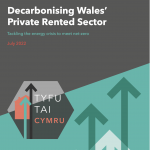Catherine May reports on the key findings from a new report on decarbonising the private rented sector.
 CIH Cymru’s Tyfu Tai Cymru project recently published a substantial report on the support that the private rented sector will need to meet the net-zero challenge, authored by Dr Donal Brown of Sustainable Collective, Severn Wye Energy Agency and Sero.
CIH Cymru’s Tyfu Tai Cymru project recently published a substantial report on the support that the private rented sector will need to meet the net-zero challenge, authored by Dr Donal Brown of Sustainable Collective, Severn Wye Energy Agency and Sero.
Our evidence demonstrates the huge undertaking needed to meet the net-zero ambition by 2050, with the headline finding of our report, assuming that the current Warm Homes Programme is continued through the 2020s, this still leaves an 89 per cent funding shortfall for meeting EPC C in the Welsh private rented sector rising to 98 per cent for the 2050 net-zero targets.
The private rented sector’s poor energy efficiency is partly explained by the ‘split incentive’ where landlords are unlikely to capture energy efficiency measures’ cost and comfort benefits. In contrast, tenants receiving these benefits are unlikely to contribute to capital costs. In addition, various studies have identified reticence among tenants in requesting energy efficiency improvements for fear of rent rises or eviction.
A consistent issue raised during the interviews and workshop was the complex and overlapping regulatory environment for private landlords. Some 75 per cent of landlords are non-professional or accidental landlords, who are often time poor and are poorly informed about the range of obligations they face. ‘You have to have information. [It’s] probably there and I haven’t found it. I’m not aware of it is the answer.’
There were concerns that if not implemented with greater support, new energy efficiency and decarbonisation regulations could exacerbate this picture and lead to further disengagement and non-compliance.
 We are calling on Welsh government to develop a long-term plan for the decarbonisation of the housing stock and the evolution of the private rented sector, which needs to be rooted within the context of other priorities, for example fire safety, homelessness prevention and implementing the Renting Homes (Wales) Act. This should include setting targets and developing accountability within different government departments for meeting them.
We are calling on Welsh government to develop a long-term plan for the decarbonisation of the housing stock and the evolution of the private rented sector, which needs to be rooted within the context of other priorities, for example fire safety, homelessness prevention and implementing the Renting Homes (Wales) Act. This should include setting targets and developing accountability within different government departments for meeting them.
This plan must be inclusive and bring both landlords and tenants on this journey, allowing them to co-create how programmes are designed in their local areas. This should include an effective advice and communication strategy which raises awareness among the public, providing certainty and support to households and landlords and set the direction of travel.
Our report also calls for new regulations and standards which are needed to drive the uptake of energy efficiency, and in meeting net zero objectives. This will require increased resource and better enforcement, especially for local authorities.
We also recognise the need for increased grant funding and new forms of financing are needed. The affordability crisis means fuel poverty funding should increase significantly, alongside new property linked financing and tax incentives for landlords.
A massive retrofit skills drive is needed, requiring public investment in new apprenticeships and a Welsh supply chain for low carbon technologies.
Decarbonisation of the private rented sector will require low carbon heat, especially via heat pumps, requiring government to create a level playing field, encouraging new business models, policy changes and a subsidy regime to drive down costs.
Giving evidence to the Senedd Committee, the Tyfu Tai Cymru project called on the Welsh and Westminster governments to work together to find long-term solutions which will ensure that landlords and tenants are able to play their part in reaching net-zero goals.
Catherine May is Tyfu Tai Cymru project manager